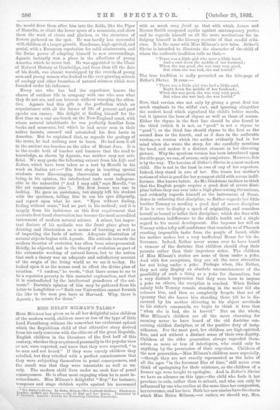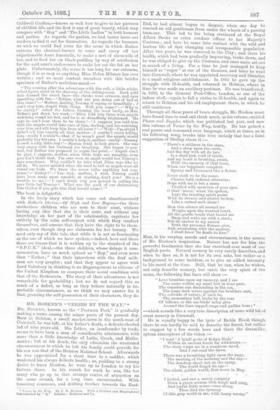MISS HELEN MILMAN'S TALES.* Miss Mir,masi has given us in
all her delightful tales children of the modern world, children more or less of the type of little Lord Fanntleroy, without the somewhat too exuberant aplomb which the Republican child of that attractive story derived from his early converse with the citizens of the great Republic. English children in the literature of the first half of this century, whether they acquiesced personally in the popular view or not, were expected, and knew that they were expected, "to be seen and not heard." If they were unruly children they rebelled, but they rebelled with a perfect consciousness that they were subjecting themselves to penal consequences, and the result was that they were unamiable as well as un- ruly. The modern child lives under no such fear of penal consequences. He is often most engaging when he is most in- subordinate. Miss Milman's delightful "Boy," for instance, composes and sings childish squibs against his nursemaid s Minor's Shrine. By Hokin ?Liman ilirri.Caldwoll Crofton). Illustrated. London: Griffith find Earn.-2.) Of High and Low Dograo. Illustrated by P. Barnard, London i Booiety tor Promoting Christian Knowledge. with as much sang froid as that with which James and Horace Smith composed squibs against contemporary poets; and he regards himself as all the more meritorious for in- dulging himself in the literary exercise of that candid criti- cism. It is the same with Miss Milman's new tales. Esther's Shrine is intended to illustrate the character of the child of whom the authentic tradition tells us that,— " There was a little girl who wore a little hood, And a curl down the middle of her forehead ;
When she was good, she was very very good, But when she was bad, she was horrid."
The true tradition is sadly perverted on the title-page of Esther's Shrine. It runs :— "There was a little girl who had a little curl,
Right down the middle of her forehead; When she was good, she was very very good, But when she was bad, she was horrid."
Now, that version sins not only by giving a great deal too much emphasis to the wilful curl, and ignoring altogether the modest hood which signalised the child's bettor moods, but it ignores the laws of rhyme as well as those of reason. Either the rhyme in the first lino should be also found in the third (which it is not, as " good " is not a rhyme to "good"), or the third line should rhyme to the first as the second does to the fourth, and as it does in the authentic version,—a version which the author evidently had in her mind when she wrote the story, for she carefully mentions the hood, and makes it a distinct element in her charming picture. Why the spurious version has been introduced upon the title-page, we can, of course, only conjecture. However, this is by the way. The heroine of Esther's Shrine is a most modern child. She is not in the least in awe of any of her superiors. Indeed, they stand in awe of her. She treats her mother's notions of what is good for her youngest child with serene indif- ference. She knows better. As Mr. Gladstone inclines to think that the English people require a good deal of severe disci- pline before they can ever take a high place among the nations, and evidently regards himself as the instrument of Provi- dence in enforcing that discipline, so Esther regards her little brother Tommy as needing a good deal of severe discipline if he is ever to display a spark of originality, and considers herself as bound to inflict that discipline ; which she does with conscientious indifference to the child's health and a single regard to his moral development. She imposes her will on Tommy with a lofty self-confidence that reminds us of Pharaoh exacting impossible tasks from the people of Israel, while his mother makes but a very ineffectual Moses for his de- liverance. Indeed, Esther never seems ever to have heard a rumour of the doctrine that children should obey their parents rather than their imperious sister. The children of Miss Milman's stories are none of them under a yoke. And with few exceptions, they are all the more attractive for not being under a yoke. Perhaps when, like Esther, they not only display an absolute unconsciousness of the possibility of such a thing as a yoke for themselves, but a very distinct impression that they were born to impose a yoke on others, the exception is reached. When Esther calmly bids Tommy remain standing in the water till she releases him, and then so completely forgets that act of tyranny that she leaves him standing there till he is dis- covered by his mother shivering in his abject servitude to his sister's commands, we begin to think it true that "when she is bad, she is horrid." But on the whole, Miss Minima's children are all the more charming for seeming never to have heard of the old doctrine con- cerning childish discipline, or of the positive duty of insig- nificance. For the most part, her children are high-spirited, free, and not without a distinct sense of their own dignity. Children of the older generation always regarded them. selves as more or less of interlopers, who could only be anything by the permission of their superiors. Children of the new generation,—Miss Milman's children more especially, —though they are not exactly represented as the heirs of all the ages in the foremost files of time," still never even think of apologising for their existence, as the children of a former age were taught to apologise. And in Esther's Shrine we have an advance on this type,—the child who feels it her province to rule, rather than to submit, and who can only be influenced by one who excites at the same time her compassion, her reverence, and her love. Both her new stories have the charm which Miss Helen Milman,—or rather, we should say, Mrs. Caldwell Crofton,—knows so well how to give to her pictures of childish life, and the first is one of great beauty, which may compare with "Boy" and "The Little Ladies" in both humour and pathos. As regards the pathos, we had better leave our readers to find it out for themselves. As regards the humour, we wish we could find room for the scene in which Esther entreats the charcoal-burner to come and carry off her objectionable Aunt Anastatia, to make a sort of slave-wife of her, and to feed her on black-pudding by way of retribution for the said aunt's endeavours to make her eat the fat on her plate. Unfortunately, the scene is too long for our columns, though it is as racy as anything Miss Helen Milman has ever written ; and we must content ourselves with this briefer specimen of Esther's malicious mood:— "The evening after the adventure with the raft, a little white- robed figure stood in the doorway of the sitting-room. Dark gold hair framed the sweet face—the cheeks were crimson, and eyes sparkling with fun.—' Esther, what are you doing out of bed at this time ?'—‘ Mother, darling, Tommy is crying so dreadfully ;
can't stop him, stupid little thing. Will you come Why is he crying ?' asked the father, turning his head lazily, as Mrs. Belasco put down her work.—' Eliza told him there were angels watching round his bed, and he is so dreadfully frightened. He says he can't bear them to be there.'—' I suppose you told him that the angels would take care of him, darling, and are watching over him and will keep him from all harm ? Well—I'm afraid I didn't tell him exactly all that, mother—I couldn't resist telling him—really I couldn't—that if he wasn't good the angels would probably box his ears. I couldn't help it, mother—really—Tommy is such a silly little boy 1 '—Marion tried to look grave. She was very angry with her husband for laughing. She began to pro- test, but Esther was prepared to argue the point.—' Angels can't be glad, I suppose, mother, when little boys are naughty, even you don't think that. I'm sure even an angel would box Tommy's ears sometimes. Why couldn't he take what Eliza says like we all do. We never minded when she used to toll us angels were all round our beds. We knew she never talks anything but non- sense!--• Esther Yes—but, mother, I wish Tommy could have been made more sensible at starting, don't you? He is a trouble to I can't think why you persist in calling the poor little lad Tommy ? What was the good of our christening him Ogilvy if you give him that horrid name ? "
The book is delightful.
In the lively story which has come out simultaneously with Esther's Shrine,—Of High and Low Degree,—the three motherless children who are sent to their aunt, without having any idea that she is their aunt, and without any knowledge on her part of the relationship, captivate her entirely by the calm self-respect with which they conduct themselves, and assume that they have the right to be them- selves, even though they are claimants for her bounty. We need only say of this tale, that while it is not so fascinating as the one of which we have spoken,—indeed, here and there there are traces that it is written up to the standard of the " S.P.C.K." ideal,—the three children, whose doings it com- memorates, have as much apiomb as "Boy," and even more than " Esther; " that their interviews with the deaf milk- man are very graphic ; and that they appear to agree with Lord Salisbury in thinking it no disparagement to citizens of the United Kingdom to compare their social condition with that of the Hottentots. The story of their adventures is not remarkable for wobability ; but we do not regard this as much of a defect, so long as they behave naturally in im- probable circumstances, as we think we may answer for it that, granting the self-possession of their characters, they do.







































 Previous page
Previous page